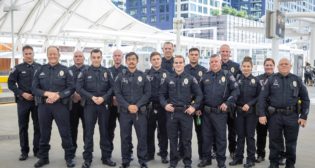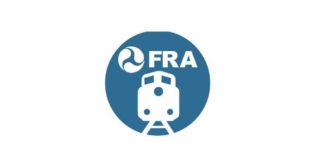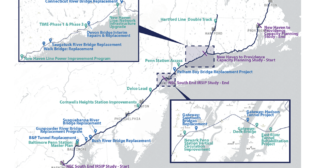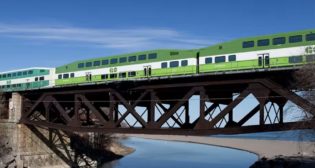
Transit Briefs: WMATA, Amtrak
Written by Carolina Worrell, Senior Editor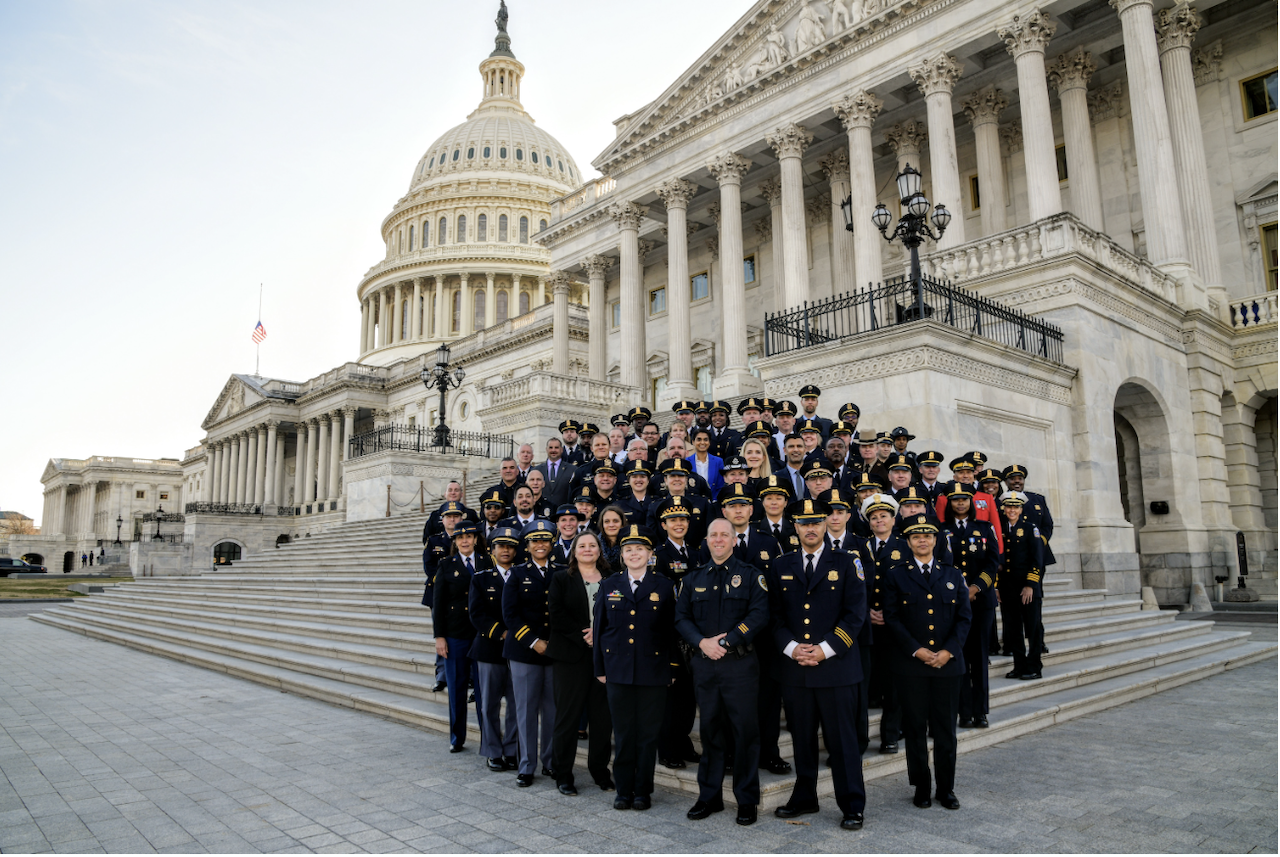
Image Courtesy of WMATA
Washington Metropolitan Area Transit Authority’s (WMATA) Transit Police leaders graduate from DC Police Leadership Academy (DCPLA). Also, Oklahoma officials want to expand Amtrak's Heartland Flyer into Kansas.
WMATA
Captain Aaron Donald and Lieutenant Michael Bradshaw of the Metro Transit Police Department have graduated from the inaugural class of DCPLA, hosted by the Metropolitan Police Department (MPD), after working together with law enforcement leaders from across the world over the last three months, WMATA announced April 7.
The class of approximately 70 rising law enforcement leaders included participants from across the U.S. and representatives from Germany, Canada, the Netherlands, and England. Participants in the three-week program, which was broken into two sessions engaged in “shaping the future of policing by developing their personal leadership abilities through discourse and interactive activities.”
Captain Donald is a 13-year veteran and currently serves as the District Commander for MTPD. He has served in a variety of assignments from being a liaison with the FBI’s Joint Terrorism Task Force to the Commander of MTPD’s Special Operations Division, as well as positions in the Office of Professional Responsibilities and Inspections and the Criminal Investigations Division.
Lieutenant Bradshaw is a 15-year veteran and currently serves as a Section Commander in the Patrol Operations Bureau. He has served in leadership positions in both the Criminal Investigations Divisions and the Canine Division.
“Throughout their careers with MTPD, Captain Donald and Lieutenant Bradshaw have demonstrated their leadership,” said MTPD Chief Michael Anzallo. “Being part of the inaugural class of the DCPLA will help them shape current and future officers and we congratulate them on their graduation.”
According to MPD, the goal of DCPLA is to “develop a strong cadre of second line supervisors who are adaptable, creative, and motivate others.” DCPLA, MPD adds, “develops leaders who demonstrate high standards of integrity, trust, openness, humility, and respect. The program facilitates a culture of positive police leaders that understand the profession of law enforcement beyond their assigned role—leaders that create and maintain a sense of purpose and innovation in their agencies.”
“We are focused on building a global legion of police leaders who strive to continuously transfer excellence at every level of a police force,” said MPD Chief of Police Robert J. Contee, III. “I am confident the leadership academy will continue to set our future police leaders up for continued advancement and success in any public safety environment.”
Amtrak
Oklahoma and Kansas officials have made a joint request that the Federal Railroad Administration (FRA) add the Heartland Flyer passenger rail line expansion to its newly established Corridor Identification and Development Program, which would give the states “access to the federal funds and the technical assistance needed to expand the passenger rail service more than 185 miles from Oklahoma City to Newton, Kans.,” according to a Tahlequah Daily Press report.
According to the report, Heartland Flyer, which is operated by Amtrak, currently runs from Oklahoma City to Fort Worth, Texas, with stops in Normal, Purcell, Pauls Valley and Ardmore in Oklahoma, and Gainesville, Texas.
“The proposed Heartland Flyer expansion would reconnect numerous Oklahoma and Kansas communities north to the national Amtrak network via the Southwest Chief,” said spokesman for the Kansas Department of Transportation Steve Hale, in an email, adding that Kansas is “very much interested” in the project and believes the extension has a “compelling case” for being included, according to the Tahlequah Press report.
According to the Tahlequah Press report, Oklahoma Republican Gov. Kevin Stitt said he met privately with U.S. Secretary of Transportation Pete Buttigieg last month to press for the rail line’s expansion, stating that the expansion would “help connect all of Texas and Oklahoma to the east-west passenger rail lines.”
Buttigieg, according to the report, encouraged Oklahoma and Kansas transportation officials to “continue to work together in a bipartisan manner.”
According to the report, State Rep. Ken Luttrell (R-Ponca City) said he’s been “pressing for a similar rail line expansion for nearly two decades because much of north-central Oklahoma is considered a ‘transportation desert’ with no convenient access to rail, bus or planes. If the Heartland Flyer got the nod to expand northward from Oklahoma City, officials are tentatively looking at adding Oklahoma stops in Guthrie, Perry and Ponca City, and Kansas stops in Arkansas City, Wichita and Newton, he said.”
Luttrell, according to the Tahlequah Daily Press report, said he believes that “the time is right to expand the route because of President Joe Biden’s push to expand and upgrade the nation’s rail transportation routes. That push has been accompanied by federal funding through a related Democrat-supported infrastructure funding measure and federal coronavirus aid.”
Luttrel also said, according to the report, that federally designated essential routes will be supported almost entirely by the federal government and that he would ultimately like to see the federal government restore the Lone Star passenger route that ran from Chicago to Houston. That route, which was discontinued decades ago, used to pass through Houston, Fort Worth, Oklahoma City, Wichita and Kansas City before ending in Chicago, the Tahlequah Daily Press reported.
According to the Tahlequah Daily Press report, Luttrell argues that the Heartland Flyer rail line expansion “would be a boon for tourism throughout Oklahoma,” citing other neighboring states that have invested in expanding passenger rail and seen “a great return on investment” with new tax revenue and tourism dollars.
Luttrell, according to the report, also believes the expansion would cost Oklahoma taxpayers less than $10 million if the state paid the entire cost. “If the federal government backs the project, it would pick up most of the initial tab for expansion, but the federal subsidy would likely decrease over time and both states would begin picking up more of the cost.”
State Rep. Ronny Johns (R-Ada), who heads the House’s transportation committee, said connecting the Heartland Flyer passenger route to the major east-west rail lines in Kansas is “a fantastic idea.”
“It comes with a heavy price tag, and so that’s the main concern, but hopefully we can work and get that done,” Johns said. “It would be fantastic because that connects us a lot better to the rest of the country.”
Bryce Boyer, a spokesman for the Oklahoma Department of Transportation, said in an email that “given the unknowns, it’s too soon to know how much the proposed expansion would cost Oklahoma taxpayers.”
According to the Tahlequah Daily Press report, if designated as an essential rail corridor, the project would receive $450,000 from the federal government to help plan the route. Oklahoma and Kansas would each contribute $25,000.
Boyer, according to the report, said ODOT and KDOT are “working together to develop a service plan for the expansion,” which is expected to be completed in the second quarter of 2024.
Boyer added that “while both agencies agree that they want the expanded route to run from Oklahoma City to Newton, Kansas, with a possible stop in Wichita, they’re still exploring what other stops to add,” according to the Tahlequah Daily Press report. That will likely be determined during the corridor study, Boyer said.
